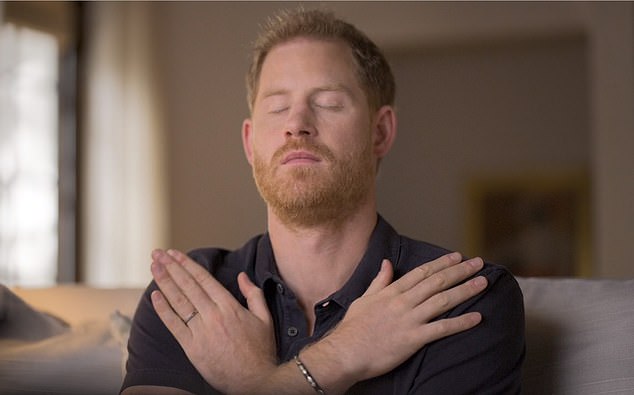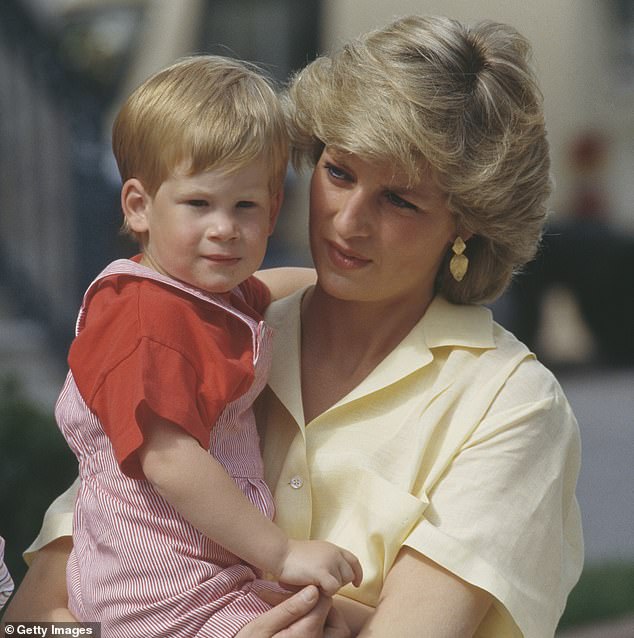Megadoses of magic mushroom therapy, backed by Prince Harry, are as mood-boosting as antidepressants, experts claim
Psilocybin, the active ingredient in magic mushrooms, could be as effective as current antidepressants, but only when given in high doses, scientists say.
Experts reached this conclusion after reviewing evidence from 15 medical studies involving about 3,000 patients.
In an article in the prestigious magazine The BMJthey said that their research on psychedelics, a class of drugs that alter a person’s perception of reality, showed that while these drugs are better than a placebo, most work no better than current antidepressants.
The psychedelics studied included MDMA (also known as ecstasy), LSD, psilocybin and ayahuasca. Prince Harry controversially approved the use of two of the substances last year, drawing criticism from medical professionals.
But only psilocybin, and then only in high doses, was found to be as effective as the currently approved selective serotonin reuptake inhibitors (SSRIs), a type of antidepressant.
Psilocybin, the active ingredient in magic mushrooms, could be as effective as current antidepressants, but only when given in high doses, scientists say (stock image)
The authors concluded that psychedelics in general have been overhyped, but that high doses of psilocybin “appear to have the potential to treat depressive symptoms.”
In the past, numerous studies have touted psychedelics (generally Class A controlled drugs in the UK) as potential treatments for mental health, including depression.
However, the Taiwanese and British experts behind the new analysis said these were often flawed.
According to them, many studies did not compare the effects of psychedelics with currently available drugs. Often, the drugs were combined with therapy, making it impossible to determine how effective the drugs were on their own.
To address this problem, researchers limited their analyses to clinical trials of psychedelics and an antidepressant called escitalopram.
To be eligible, studies had to involve the use of either type of medication alone in patients with acute depressive symptoms, or through a head-to-head comparison study.
Ultimately, only a high dose of psilocybin turned out to have the same effect as escitalopram.
However, the researchers noted that the effects of high doses of psilocybin may have been “overestimated” due to the specific design of the clinical trial, which directly compared the drug to escitalopram.
However, they concluded: ‘Serotonergic psychedelics, especially high doses of psilocybin, appear to have the potential to treat depressive symptoms.
‘Our analysis showed that the average difference at high doses of psilocybin was comparable to that of current antidepressants, with a small effect size.’
In addition, they said that none of the studies they examined showed a higher rate of serious adverse events, such as death, hospitalization or suicide attempt.
However, they did find a number of limitations. For example, they only compared the drugs based on their effectiveness in treating depression, and not on other aspects that are also important in drug use, such as side effects.
Another limitation was the small number of studies examined. However, the researchers said this was unavoidable given the limited number of eligible studies.
Another aspect to consider is that while the authors compared psychedelics to the antidepressant escitalopram, this drug and SSRIs in general are not just one type of these medications.
SSRIs are the most commonly prescribed type of antidepressant in the UK. They are safe and can be used by most people. However, there are several alternatives.
Some British experts have previously supported the idea of using psilocybin as a possible treatment for depression, but have also called for further research, particularly into the longer-term outcomes.
Dr Paul Keedwell, a consultant psychiatrist and Fellow of the Royal College of Psychiatrists, said of a separate evidence review published earlier this year: ‘Overall the results are impressive, with rapid improvement in most and large effect sizes.’
But he added: ‘There are some concerns about expectancy effects, because most patients knew when they were getting the active condition, or the higher dose of the same drug.’
‘Longer follow-up studies would be welcome and further research is needed into optimal dosing.
‘The main disadvantage is that some patients find the psychedelic effects unpleasant, and care must be taken to provide a calm environment for the treatment. Psychological preparation and debriefing, before and after dosing respectively, are crucial.’
Last year, Australia became the first country to approve the use of psilocybin for depression.
However, some experts are concerned that the therapy is going too far and too fast.
Susan Rossell, a professor at Swinburne University who led Australia’s largest study into the effects of psilocybin on depression, said at the time that more research was needed.
“These treatments are not at all well developed enough to be implemented on a large scale,” she said.
“We have no data at all on the long-term effects, so that worries me greatly. That’s one of the reasons why I’m doing this very large study.”
Psilocybin affects the part of the brain called the hippocampus, which is responsible for reflecting on thoughts and experiences and helps people define their self-image.
This is similar to the way antidepressants affect the brain to interrupt the negative thoughts that accompany depression.
While psilocybin shows promise in combating conditions such as anxiety and depression, some people may experience persistent and disturbing visions.
These reactions, which can affect up to one in ten people taking the drug, can lead to ‘significant psychological distress’ such as paranoia, intense fear and even vivid hallucinations.

Last year, Prince Harry admitted to using psilocybin and ayahuasca, a plant-based psychedelic made from the leaves of a shrub.

He said he took the drugs in an attempt to help him heal the “grief” and “trauma” he felt after his mother’s death. Pictured is Harry with Princess Diana in 1987
However, proponents of psychedelic therapy argue that bad trips are rare and that even when they do occur, they often yield challenging personal insights that stimulate healthy psychological growth.
The use of psychedelics for mental illness is generally controversial.
Some experts are concerned about the current lack of good quality evidence on the effectiveness of these agents and their possible long-term effects.
The demand for psychedelics has also come under fire following horrific claims of sexual abuse by patients undergoing clinical trials of the drugs.
Experts have previously warned that celebrities such as Prince Harry are promoting the positive effects of psychedelics and that this could encourage others to try the drugs too, with potentially dangerous consequences.
The Duke of Sussex has said he does not recommend using ayahuasca recreationally, but he has emphasised its positive effects.
“When you’re dealing with tremendous loss or grief or trauma, and you’re doing it with the right people, these things are like medicine,” he said.
His statements were criticized at the time by doctors and by the families of people who committed suicide or were poisoned shortly after taking the drug.
One of them was Dr Max Pemberton, a psychiatrist with the NHS in London and a columnist for The Daily Mail, who called the comments “highly irresponsible” and “promoting yet another quack therapy”.
“Harry clearly has no idea of the serious harm these drugs can cause to users. I see that harm with disturbing regularity in psychiatric wards in hospitals,” he said.
There have been previous calls for psychedelics to be made available to patients in the UK.
In February 2022, David Nutt, professor of neuropsychopharmacology at Imperial College London, co-authored a research review in the Journal of Psychopharmacology.
It has been argued that psychedelic drugs have an unfairly bad reputation and that ‘many — but not all — persistent negative perceptions of psychological risks are not supported by currently available scientific evidence’.
Professor Nutt was sacked as chairman of the independent Advisory Council on the Misuse of Drugs (ACMD) in 2009 by Labour Home Secretary Alan Johnson after he had written a paper for the Home Office claiming that the Class A drug ecstasy was safer than horse riding.
He also recommended that cannabis, ecstasy and LSD should be considered less harmful than alcohol and cigarettes.
